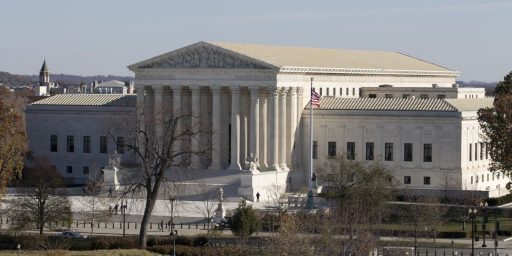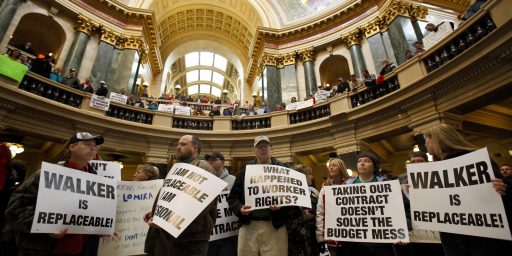Pentagon’s New Personnel System Blocked
The Defense Department’s overhaul of its civilian personnel system was tossed by a federal judge yesterday:
A federal judge blocked the Defense Department from implementing much of its new personnel system yesterday, handing the Bush administration a major setback in its efforts to streamline work rules and install pay-for-performance systems in federal workplaces.
In a 77-page decision, U.S. District Judge Emmet G. Sullivan ruled that the Pentagon’s National Security Personnel System (NSPS) fails to ensure collective bargaining rights, does not provide an independent third-party review of labor relations decisions and would leave employees without a fair process for appealing disciplinary actions. “Taken as a whole, the design of these regulations appears to rest on the mistaken premise that Congress intended flexibility to trump collective bargaining rights,” wrote Sullivan, who noted that the new regulations “entirely eviscerate collective bargaining.”
The ruling marked the second time in six months that a federal judge has stiff-armed the Bush administration in its ambitious plans to rewrite federal personnel rules to curtail the power of labor unions, more strongly tie pay raises to job performance, and make it easier to hire, promote and discipline federal employees.
The two court decisions mean the new systems at Defense and the Department of Homeland Security — each more than two years in the making, and affecting nearly 800,000 civilian employees — appear destined either for lengthy court appeals or time-consuming revisions. Also in limbo are the administration’s plans to overhaul federal pay at agencies government-wide.
Reform of the system is long overdue and much of what has been done by the Pentagon has been successfully implemented elsewhere in the civil service system, including congressional agencies like the GAO and Congressional Research Service.
Given that the judge’s ruling is mere statutory interpretation, fixing this is relatively simple: Congress just needs to pass a law implementing the new system rather than having it imposed by the Defense Department.
Update (3/1): While I am not a civil service employee, I work on-site at a DoD facility. The following clarification was posted on my log-in screen this morning:
On Feb. 27, the U.S. District Court in the District of Columbia ruled in the case of AFGE vs. Rumsfeld that some portions of the National Security Personnel System (NSPS) could not be implemented as planned by DOD. However, the injunction issued by the court applies only to the NSPS provisions for adverse actions, appeals, and labor relations.
The ruling does not affect the other components of NSPS to include pay banding and performance management. Therefore, DISA is moving ahead as previously planned to implement the components of NSPS not impacted by the court decision.
Interesting.
________
Related posts:






I can’t find collective bargaining, third-party reviews or labor relations decisions, or disciplinary actions anywhere in the Constitution.
Oh never mind. It’s in Das Kapital. Silly me.
rwp: The judge wasn’t ruling on ConLaw but on civil service personnel law set forth by Congress. I don’t have much grounding in the latter but he is likely right.
Um… I believe the judge was interpreting a statute, something that is found in the constitution. You know, just because a judge does something the President doesn’t like does not necessarily make him or her an activist judge.
Well looks like congress should get off its behind, and change some laws, and while they are at it, they should thumb their noses at the labor unions.
Ha ha, that’s the best laugh I’ve had in a long time.